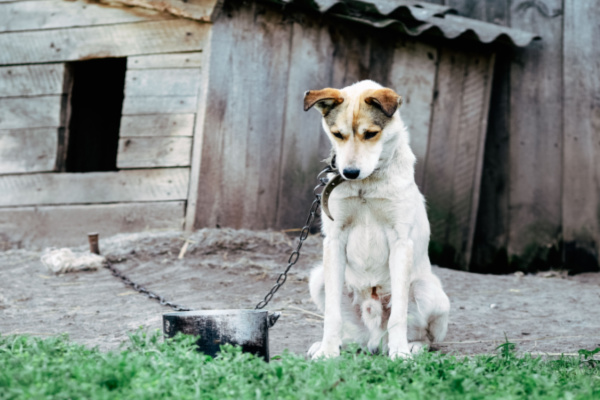The entire month of January is known as National Unchain A Dog Month. This national pet holiday was created in order to raise awareness to the hardship that dogs may face in winter weather. And January is the perfect time for it, too – perhaps you’ve noticed (or are experiencing) some frigid temps this month. Well, if you’re feeling it, your pets do, too. Dogs can easily contract frostbite, exposure, and dehydration when water resources reach a freezing point.
Here are a few tips and precautions that you should take during the inclement winter weather:
Ensure Your Dog Has Proper Shelter
If your dog spends most of its time outside make sure that your dog has proper shelter facing towards the sun. Ideally, doghouses should be made of wood (plastic doesn’t insulate as well, and metal conducts cold) and should be positioned in a sunny location during cold weather. Raise the house off the ground several inches, and put a flap over the door to keep out cold drafts. Use straw for bedding; rugs and blankets can get wet and freeze.
Increase Your Dog’s Food Intake
During the winter if your dog stays outsider increase your dog’s food intake because they are burning more calories trying to keep warm. Also, be sure that animals are up-to-date on vaccinations and are free of internal parasites, which can rob them of vital nutrients.
Let The Dogs In
Allow animals inside, especially puppies and kittens, elderly animals, small animals, and dogs with short hair, such as pointers, beagles, Rottweilers, pit bulls, and Dobermans. Their bodies are too fragile to withstand the inclement winter weather.
Put A Coat or Sweater On Your Pup
When you take your dog outside for extended periods of time, consider doggie clothes – wearing a coat or sweater can keep their bodies heated (as well as fashionable).
Untangle those Tethers
Verify that your dog’s tethers aren’t tangled up and away from trees or miscellaneous objects that could block them from getting into their shelter.
Check The Chain Tightness
The chain on your dog’s neck should be secure and not too tight. Make sure the chain isn’t too tight or made up of harsh material. If not adjusted properly it could cause your dog’s neck to become raw with sores.
Behavioral Issues
Chaining up dogs can not only cause physical damage but psychological damage as well. Dogs on tethers can become protective and unsocial due to being constantly on the chain.
Don’t Let Them Roam
Don’t allow your cat or dog to roam freely outdoors. During winter, cats sometimes climb under the hoods of cars to be near warm engines and are badly injured or killed when the car is started. (To help prevent this, bang loudly on the hood of your car before starting the engine.) Animals are also attracted to deadly antifreeze and can become disoriented when there is snow or ice on the ground. More animals are lost during the winter than during any other season.
If it’s Too Cold for You, it’s Too Cold for Your Dog
Last but not least, if the weather conditions are too much for you. It will not be suitable for your dog either.
All dogs need nutritious food, fresh water, and sturdy roofs over their heads. But what they really crave is love, attention, and companionship from their human families, their pack. Scratches behind the ears, games of fetch, and walks around the block mean the world to them. Curling up next to you is their idea of heaven.
If you know someone with an outside dog, offer to play with the dog and take him or her for walks. Bring treats and toys—they mean so much to a dog who has little else to do. Make sure that he or she has adequate food, water, and shelter—all of which are required by law—and report neglect to authorities. Your call could mean the difference between life and death for an animal left outside in the cold.
All dogs crave love, attention, and companionship from their owners so let’s all try to Unchain in January!
—
Photo Credit: DreamHack / Shutterstock.com
